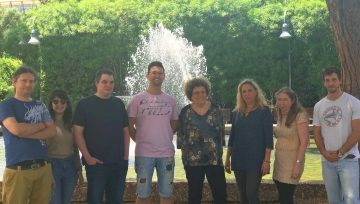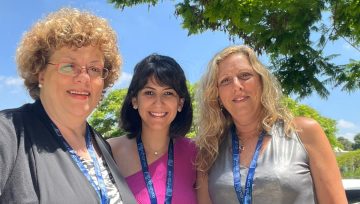The Committee for Graduate Studies in the Faculty of Biology selects the leading scientific article each month from all the scientific articles published for that month.
We are pleased to announce that the winner of the October 2023 Paper of the Month is Dr. Jessie Safieh. The research was conducted in collaboration with the two laboratories of Associate Professor Tali Haran and Professor Dina Ron, whose paper was accepted for publication in PNAS.
Additional researchers involved in the study are doctoral students Ariel Hazan and Hanan Salim, postdoctoral fellow Dr. Pratik Vyas, and the lab manager of Prof. Tali Haran, Dr. Yael Danin-Poleg.
On the occasion of the win, we asked Jessy Safieh to provide us with some interesting details about the study, the path that led to the research, and a bit about him.
• Hi, could you introduce yourself in a few words?
My name is Jessy Safieh, and I am from Nazareth City. I pursued my bachelor’s degree in biology and business administration, at the Hebrew University in Jerusalem. For my second and third degrees, I studied at the biology faculty in the Technion within the same laboratory.
• Could you tell us about your current article/research what was the main purpose of the research and what did you discover?
The tumor suppressor protein p53 functions as the guardian of the genome in our cells, overseeing the activity of vital genes essential for cell homeostasis. p53 is found mutated in ~80% of cancer cases. When our cells undergo stress, the level of p53 increases, thus determining which genes should be activated depending on the severity of the stress. As an initial response to stress, p53 halts cell division, attempting to repair any damage. If this repair process proves unsuccessful, p53 can command the cell to undergo self-destruction. Our research uncovered that the initial step toward determining the cellular functional outcome of p53 regulation is influenced by the flexibility of p53 binding motifs at these genes. This adaptability plays a crucial role in enabling p53 to make decisions regarding the cell’s fate in response to stress.
•Can you elaborate on the importance of the discovery? How will it serve you and what directions does it take? What is the application of the discovery (domains, solutions)?
The discovery of the influence of p53 binding site flexibility on the initial decisions regarding the functional outcome of p53 regulation is significant for several reasons. Firstly, this discovery opens avenues for designing more effective treatments for conditions where cellular stress plays a critical role, such as cancer. By manipulating the flexibility of p53 binding sites, we may be able to fine-tune cellular responses and potentially improve the outcomes of stress-related diseases. Moreover, this discovery may contribute to advancements in biotechnology and genetic engineering. Understanding how p53 interacts with genes at the molecular level could inform the development of more precise and controlled gene-editing techniques. This has implications for creating genetically modified organisms and addressing genetic disorders. Overall, the discovery not only enhances our fundamental understanding of cellular processes but also holds promise for practical applications paving the way for innovative solutions in these domains.
• When you are not “doing” science, what do you do?
I volunteer at a women’s against violence organization, primarily working on the hotline. Additionally, I enjoy taking nature walks with my dog, Zaatar.
• what are your plans for the future of your career?
I am driven to make a profound impact by developing innovative solutions and addressing critical unmet medical challenges. My vision encompasses not only advancing scientific knowledge but also translating that knowledge into tangible solutions that benefit communities worldwide.
➡ A link to the full article:http://2023-05713R_Merged_PDF.pdf
➡ A link to Prof. Haran’s lab site: https://taliharan.net.technion.ac.il/
➡ To Prof. Haran’s page: https://biology.technion.ac.il/en/member/haran/
➡ To Prof. Ron’s page: https://biology.technion.ac.il/en/member/ron/













